List of Ashta Vasus names (information, significance, importance) (Purushottama masam relationship)
Namaste friends, how are you doing today? Welcome to #BhagavanBhakthi website / blog.
Bhagavan Lord Sri Krishna (Vishnu, Rama, Trivikrama, Narasimha, Vamana, Parashurama) and Goddess Rukmini (Lakshmi, Sita, Dharini) blessings to you and your family!
In this website / blog, you will always learn about #Hinduism #Sanskrit language.
Also subscribe to my YouTube channel from this link #BhagavanBhakthi to view videos about #Hinduism #Sanskrit language.
Just before going to “List of Ashta Vasus names (information, significance, importance) (Purushottama masam relationship)“, let us know a brief, basic and very important information.
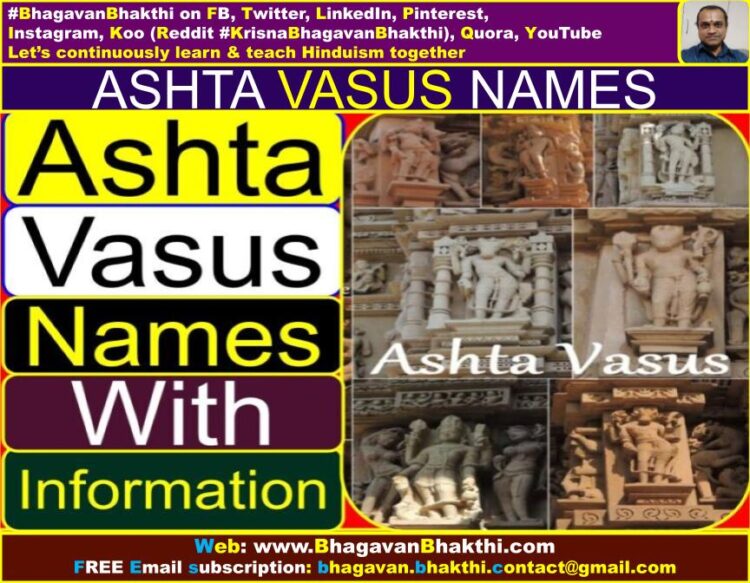
First let us know the meaning of the words ‘Ashta Vasu‘ before moving forward:
Here, Ashta Vasu = Ashta + Vasu = Eight + Vasus. Eight Vasus (Ashta Vasus) are the group of Devatas (Deities) (Demigods) as per Sanatana Dharma.
In this post (article) you will know the following (contents):
Ashta Vasus represent the basic aspects of nature, that is, cosmic natural phenomenon | List of Ashta Vasus names (information) | Ekadasha (11) Rudras according to Padma Purana / Srimad Bhagavatam |
Dvadasha Adityas (12 Adityas) names | Information about the significance of Lord Sri Vishnu as Antaryami (who is present inside us as divine God) of Ashta Vasus | Lord Sri Vishnu as antaryami of the Vasu named Drona information |
Lord Sri Jishnu as the antaryami of Vasu named Dhruva information | Lord Sri Keshava (Keshav) as the antaryami of the Vasu named Praana information | Lord Sri Vishnu as the antharyami of the Vasu named Dosha information |
Lord Sri Hari (Vishnu) as the antaryami of the Vasu named Arka information | Lord Sri Krishna as the antaryami of the Vasu named Agni information |
Lord Sri Adhokshaja as the antaryami of the Vasu named Dyau information | Lord Sri Madhava as the antaryami as the Vasu named Vibhavasu information | And many more…
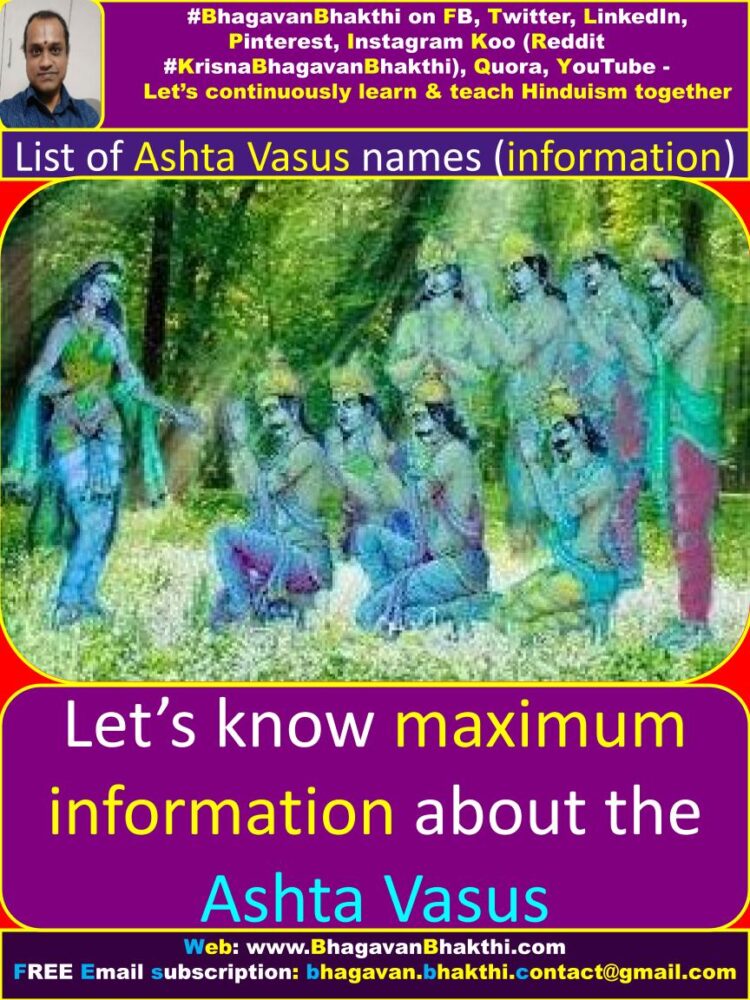
Vasus are a class of Vedic Devatas (Deities) (Demigods) and they are eight in number and thus they are known as ‘Ashta Vasus‘.
In Hindu Sanatana Dharma, the Devatas (Deities) (Demigods) Vasus (वसु) are attendant deities of Lord Sri Vishnu and also of Lord Sri Indra.
The Ashta Vasus or 8 Vasus are described in the Epic Ramayana as the children of Maharishi Kashyapa and his consort Aditi Devi. These are the elemental Devatas (Demigods) who are associated with Lord Sri Indra Deva (Lord of Svarga Loka / Heaven).
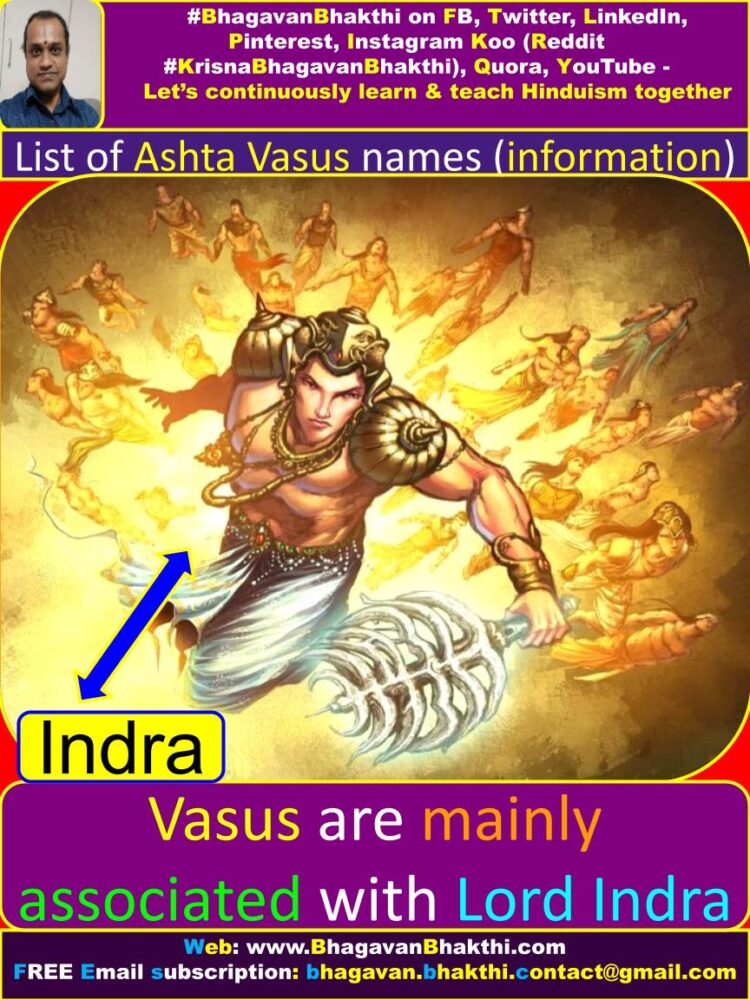
Ashta Vasus represent the basic aspects of nature, that is, cosmic natural phenomenon and they are as given below:
1. Prithvi / Earth | 2. Agni / Fire | 3. Jala / Water | 4. Vayu / Wind | 5. Akasha / space / sky | 6. Surya / Sun | 7. Chandra / Moon | 8. Nakshatras / Stars
All the names of the ‘Ashta Vasus‘ differ in their nomenclature names in various granthas (Hindu Sacred Texts) and Puranas. There is no similarity in the list of the names when compared to more than one grantha (Hindu Text) or Puranas.
This could be because, they are the same set known names, but with different variety of names, that is, same Vasus, but one Vasus may have different names.
(This to similar to the common people on earth, who usually have different names, that is, one person with more than one name).

List of Ashta Vasus names (information) is as given below:
Names of ‘Ashta Vasus’ as per few of versions are as given below:
One is as below:
1. अहस् (ahas) (Ahas) | 2. अनल (anala) (Anala) | 3. अनिल (anila) (Anila) | 4. धरा (dharā) (Dhara) | 5. ध्रुव (dhruva) (Dhruva) | 6. प्रत्यूष (pratyūṣa) (Pratyoosha) | 7. प्रभास (prabhāsa) (Prabhaasa) | 8. सोम (sōma) (Soma)
Second is as below:
1. [अनल (पावक-अग्नि-fire)] [anala (pāvaka-agni-fire)] [Anala (Paavaka-Agni-Fire)] | 2. [अनिल (प्राण-वायु -air)] [anila (prāṇa-vāyu-air)] [Anila (Praana-Vaayu-Air)] |
3. [अप (जल-वरुण-water)] [apa (jala-varuṇa-water)] [Apa (Jala-Varuna-Water)] | 4. [धरा (भूमि-earth)] [dharā (bhūmi-earth)] [Dhara (Bhoomi-Earth)] |
5. [ध्रुव (नक्षत्र-star)] [dhruva (nakṣatra-star)] [Dhruva (Nakshatra-Star)] | 6. [प्रभास (ज्योति-प्रभा-radiance)] [prabhāsa (jyōti-prabhā-radiance)] [Prabhaasa (Jyoti-Prabha-radiance)] |
7. [प्रत्यूष (प्रभात-dawn)] [pratyūṣa (prabhāta-dawn)] [Pratyoosha (Prabhaba-Dawn)] | 8. [सोम (दिव्य अमृत-nourisher)] [sōma (divya amr̥ta-nourisher)] [Soma (Divya Amrit-Nourisher)]
Third is as given below:
1. द्रोण (drōṇa) (Drona) | 2. ध्रुव (dhruva) (Dhruva) | 3. दोष (dōṣa) (Dosha) | 4. अर्क (arka) (Arka) | 5. अग्नि (agni) (Agni) | 6. द्यौ (dyau) (Dyau) | 7. प्राण (prāṇa) (Praana) | 8. विभवसु (vibhavasu) (Vibhavasu)
Here we should note that, Anala is one of the names of Ashta Vasus. Similarly, Anala is another name of Lord Sri Agni Deva (Fire god) which is insatiable.
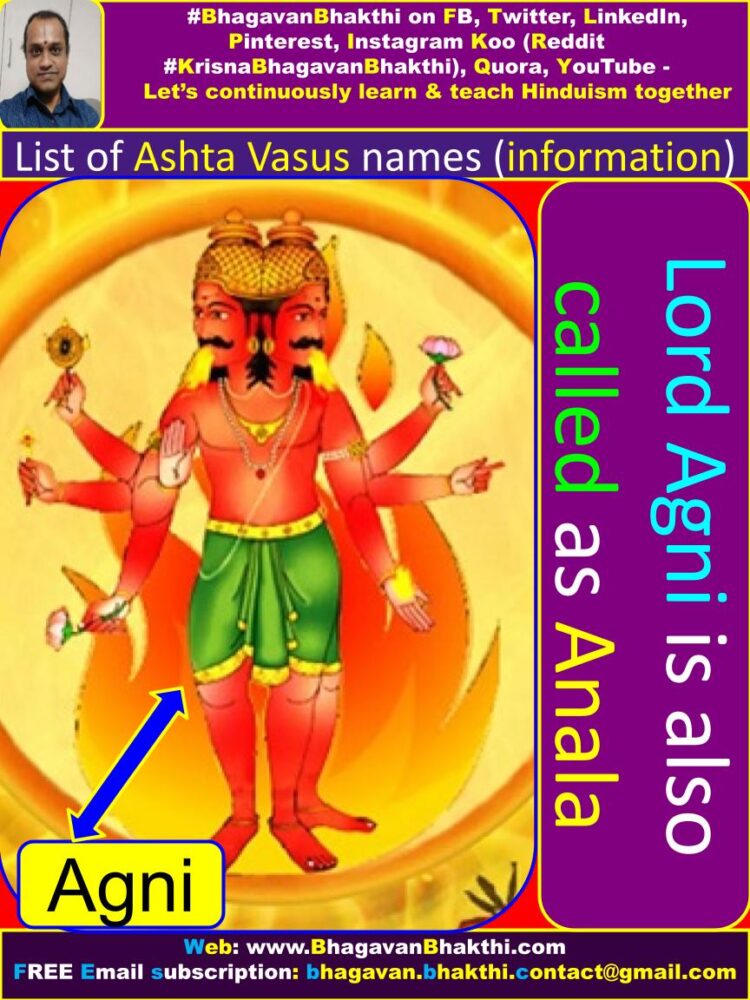
Lord Sri Vishnu is also known as Anala (we can refer this with the shloka no. 32, 76 of Sri Vishnu Sahasranama stotram), means – “He is the one whose strength and energies are infinite and unlimited, have no bounds and is insatiable”.
Among Ashta Vasus, Anala (Agni) stands first. Anila is another name of ‘Praana‘, that is, Lord Sri Vayu Deva (The Air God). Lord Sri Vishnu is known as Anilah (sloka no. 25 of Sri Vishnu Sahasranama stotram).
Lord Sri Vishnu is the main life force and the source of life for everyone and without Lord Sri Vishnu even Lord Sri Vayu Deva (air God) can’t sustain by himself (air can’t sustain by itself).
Also similarly, Lord Sri Vishnu is called as Somah (shloka no. 54 of Sri Vishnu Sahasranama Stotram) the divine nectar (and provider of nectar) and the nourisher & protector of all the vegetation.
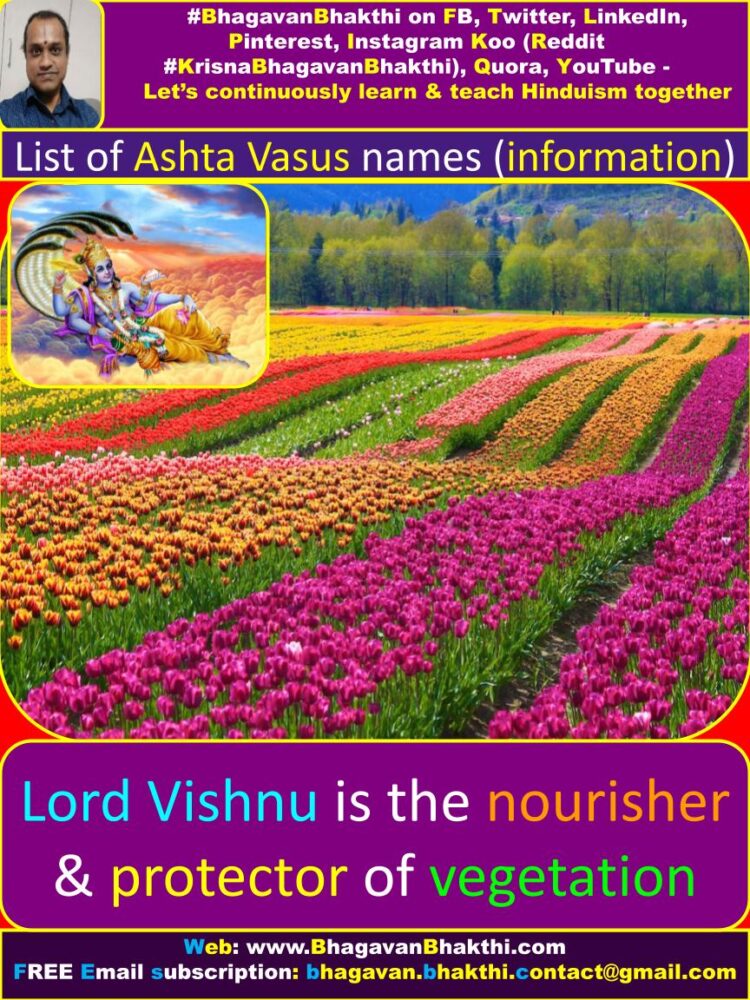
वसु (vasu) (Vasu) (read is Vasu and not as वासु / vāsu / Vaasu) means dweller or dwelling.
In shloka no. 29, 74 of Sri Vishnu Sahasranama stotram, we can find a reference to the word Vasu. Here Lord Sri Vishnu is eulogized as वसुः / vasuḥ / Vasuh. Lord Sri Vishnu is the dweller from everywhere and everything dwells in Him.
Lord Sri Vishnu is popularly known as वासुदेव (vāsudēva) (Vaasudeva) (read as Vaasudeva and not Vasudeva), that is, he the head of ‘Vasus‘ (read as Vasu and not as Vaasu).
Meaning of Vaasudeva = Vaasu + Deva, that is, Deva means the Lord and Vaasudeva (Lord Sri Vishnu / Krishna) is the Lord of all the ‘वसु / Vasus‘ (read as Vasu and not as Vaasu). Lord Sri Vishnu is the one who Himself is a वसु (Vasu).
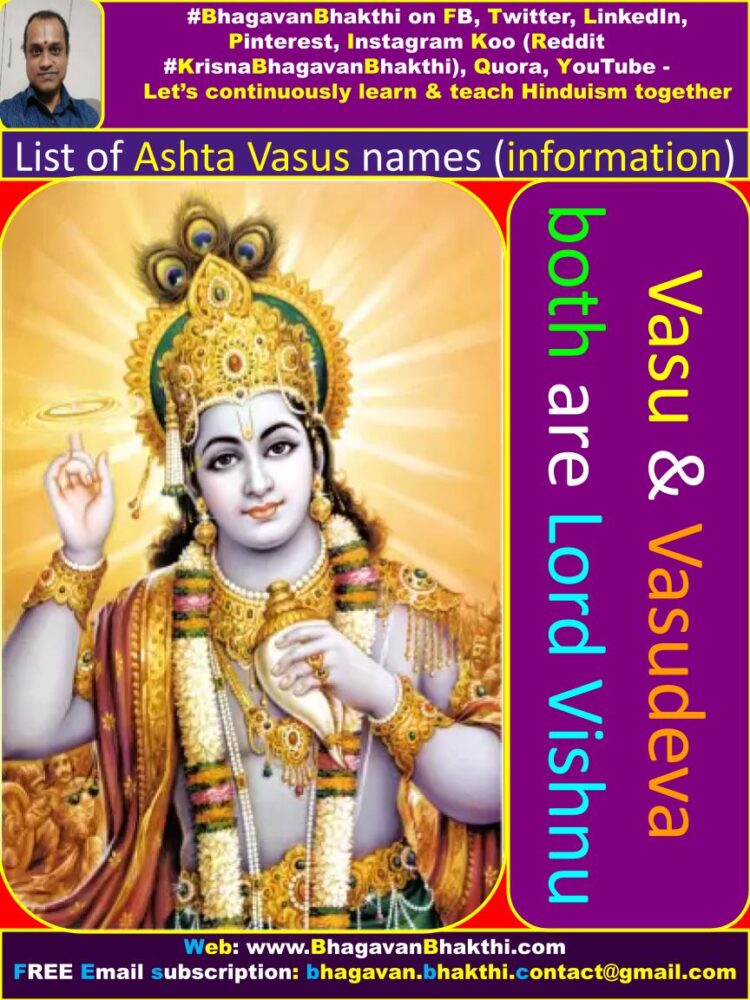
In Srimad Bhagavad Gita of ‘Vibhooti Yoga‘, in 10th chapter, Lord Sri Krishna says that, “Vasuunaam Paavakaschaasmi”, that is – ‘I am (Lord Sri Krishna) is the Agni among Vasus’, (Paavaka is another name of Lord Sri Agni Deva).
In the 28th Dvapara Yuga (the Yuga when Lord Sri Krishna took the avatar), ‘Ashta Vasus‘ took birth on earth as sons of the Goddess Sri Ganga Devi and Kuru Kingdom King Shantanu due to a curse from Maharshi Vasishtha.
Among eight children of Goddess Sri Ganga Devi, seven of them got liberated from this mortal world as soon as they took birth, whereas the eighth son by name Dyau (Prabhasa) had to endure a longer life.
This Vasu named Dyau was none other than the great warrior of Mahabharata fame Bhishma (Bhishma Pitamaha) (Devavrata).
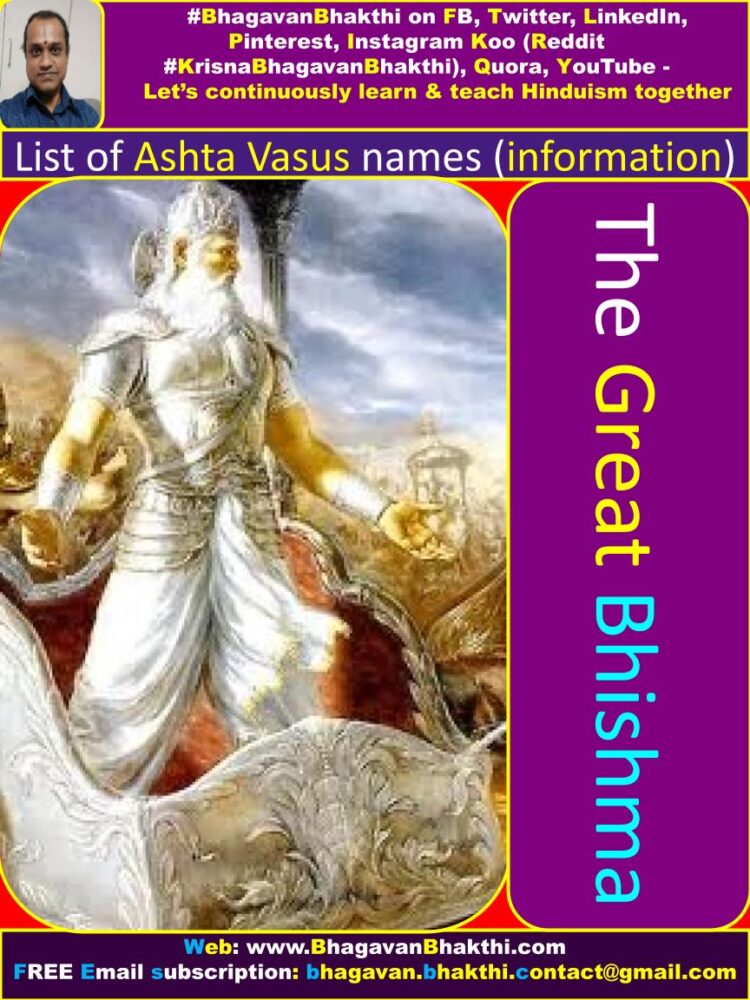
Also, we should note that, Lord Sri Krishna’s foster father Nanda Gopa (Nanda Maharaj) was an avatar of one of the Ashta Vasus and his name was Drona (not the Dronacharya).
Along with Ekadasha (11) Rudras + Dvadasha (12) Aadityas + Prajapati + Vashatkaara, ‘Ashta Vasus’ (8 Vasus) form a significant group of 33 number main Devatas (Demigods).
Ekadasha (11) Rudras names according to Padma Purana / Srimad Bhagavatam are as given below:
1. Manyu | 2. Manu | 3. Mahanasa | 4. Mahan | 5. Shiva | 6. Rta-Dhvaja | 7. Ugra-Reta | 8. Bhava | 9. Kaala | 10. Vaamadeva | 11. Dhrta-Vrata
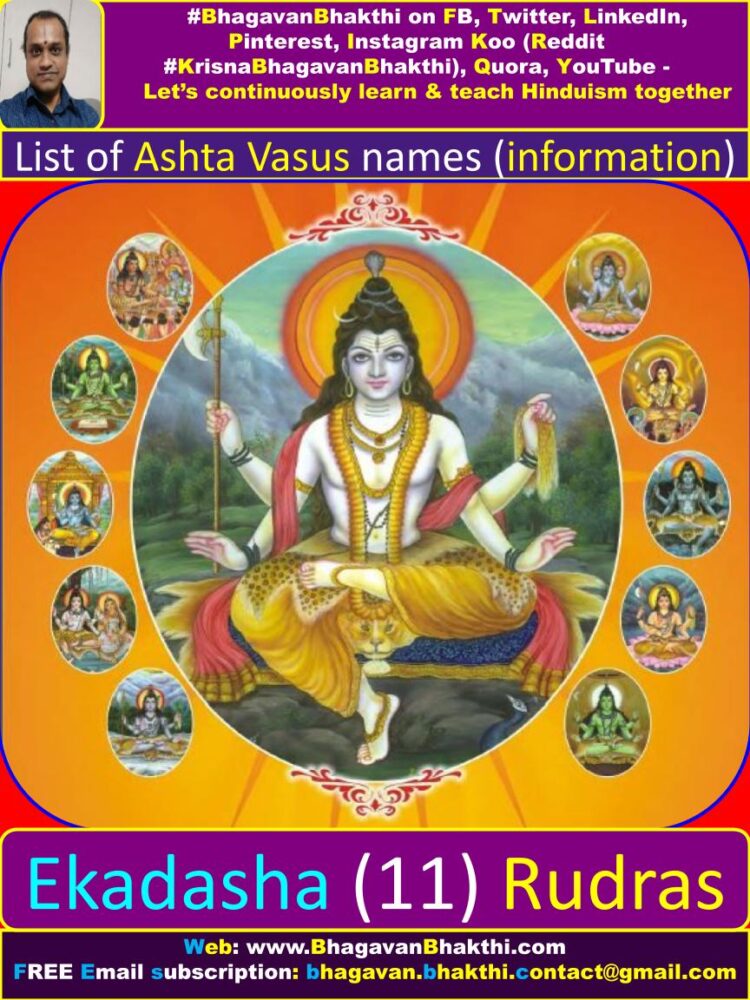
Dvadasha Adityas (12 Adityas) names are as given below:
1. AruNa | 2. Aryama | 3. Babhasti | 4. Bhaanu | 5. Divaakara | 6. HiraNyarEtasa | 7. Indra | 8. Mitra | 9. Ravi | 10. Surya | 11. Tapana | 12. ViShNu
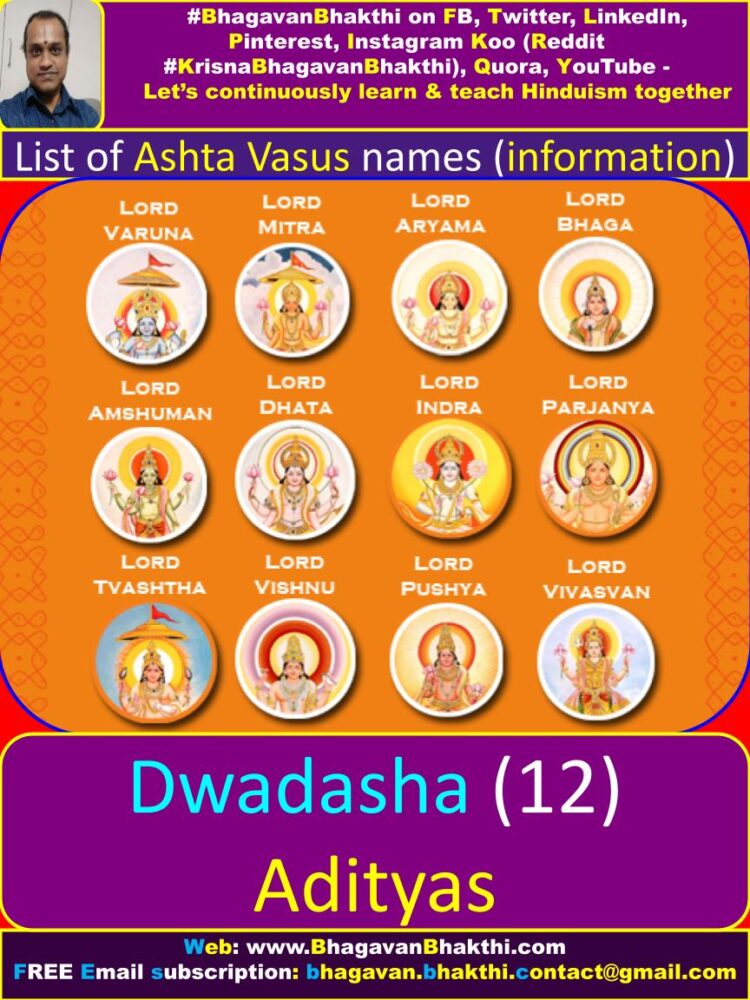
Ashta Vasus are Devatas (Demigods) who dwell in the terrestrial region.
Information about the significance of Lord Sri Vishnu as Antaryami (who is present inside us as divine God) of Ashta Vasus:
‘Adhika Masa‘ (Adhik maas) (Adhika masam) is the most pavitra masam (sacred month) dedicated to the most sacred Lord Sri Vishnu.
Lord Sri Vishnu is the ‘Maasa Niyaamaka‘ (main controller of that month) of ‘Adhika masam‘ with the name पुरुषोत्तम (puruṣōttama) (Lord Purushottama) (Purushottam).
For this reason, Adhika Masam is also referred as पुरुषोत्तम मासं (Purushottama Masam) (Purushottam maas) (Purushottama masa).
Ashta Vasus (8) + Ekadasha Rudras (11) + Dvadasha adityas (12) + Prajaapati (1) + Vashatkaara (1) relationship information is as given below:
Thus making a total of 33 Devatas (Demigods), together are the Presiding Deities of Adhika Masam [Please see above for the names of these Devatas (Demigods)].
Here Lord Sri Vishnu in the name of Purushottama (another name of Lord Sri Vishnu) is the governing Lord and Antaryami (who is present inside as the divine God) of all these Devatas (Demigods) (Deities).
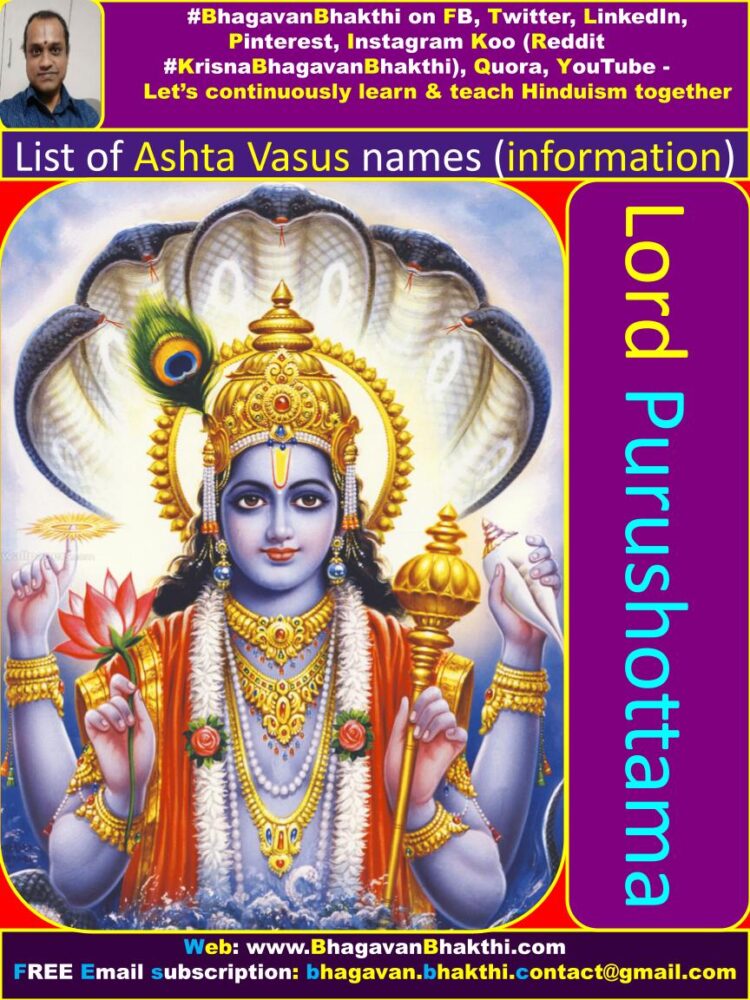
Information about Lord Sri Vishnu’s names with explanation as the antaryaami of different Vasus is as given below:
Lord Sri Vishnu as antaryami of the Vasu named Drona information is as given below:
No can be equal to or above Lord Sri Vishnu and he is the primordial Sarvottama / Supreme Bhagavan (Lord). Lord Sri Vishnu is the ultimate, he pervades the many, various and different objects of multiverses and all the souls.
Lord Sri Vishnu stays as the inner soul of every living and non-being in this multiverse (unlimited Universes). Lord Sri Vishnu protects and enjoys all entities in the multiverses, but still remains unscathed by their faults and off course he doesn’t has any fault(s) at all.
Lord Sri Vishnu is indestructible. Lord Sri Vishnu is present since the unknown time and will remain until the grand infinite period.
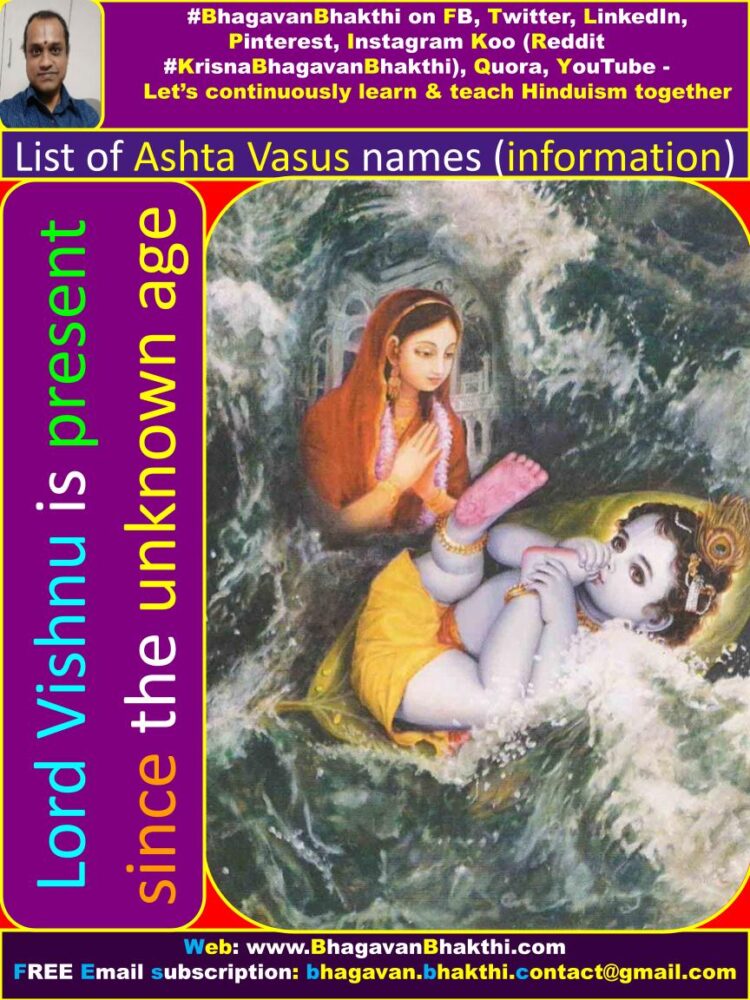
Lord Sri Vishnu is the solitary unique soul of outstanding excellence. Lord Sri Vishnu is the mega spirit present in every being of the multiverses and the only Aatman (soul) that existed in the beginning before the creation of the multiverses.
Lord Sri Vishnu is the one who dwells in each and every element of this multiverses and everything dwells in Him.
एको विष्णुर्महद्भूतं पृथग्भूतान्यनेकशः । त्रींलोकान्व्याप्य भूतात्मा भुङ्क्ते विश्वभुगव्ययः ॥ 20 ॥
ಏಕೋ ವಿಷ್ಣುರ್ಮಹದ್ಭೂತಂ ಪೃಥಗ್ಭೂತಾನ್ಯನೇಕಶಃ । ತ್ರೀಂಲೋಕಾನ್ವ್ಯಾಪ್ಯ ಭೂತಾತ್ಮಾ ಭುಂಕ್ತೇ ವಿಶ್ವಭುಗವ್ಯಯಃ ॥ 20 ॥
ēkō viṣṇurmahadbhūtaṁ pr̥thagbhūtān’yanēkaśaḥ। trīnlōkānvyāpya bhūtātmā bhuṅktē viśvabhugavyayaḥ॥ 20॥
This shloka (sloka) (hymn) is taken from ‘Sri Vishnu Sahasranama Stotram – Phala Shruti‘ shloka no. 20.
Meaning of this shloka is as given below : Ancient Hindu scripts declare Lord / God as “Eko Vishnu Mahadbhootah”, that is, there is only one gigantic presence in the world and that is none other than Lord Sri Vishnu who is present in everything and everywhere.
Lord Sri Vishnu is matchless and unparalleled in excellence, he is the primordial Sarvottama / Supreme Lord, the mega spirit, pervades the many, in various forms and different objects of multiverses.
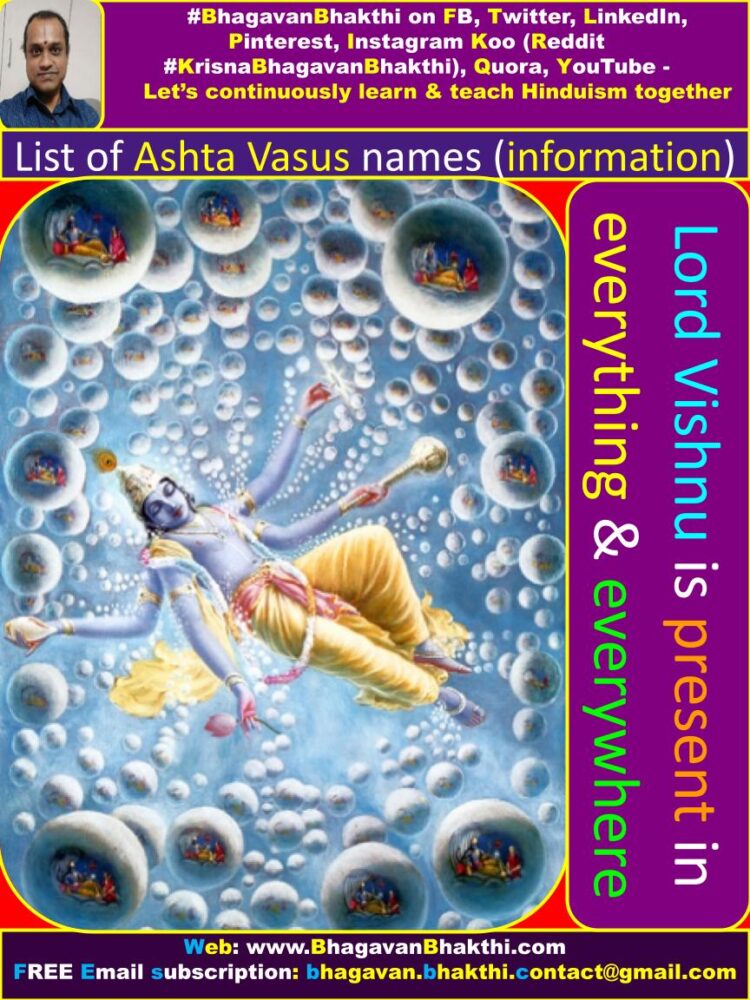
Lord Sri Vishnu lasting as the inner soul of everyone, He protects and enjoys all entities in the multiverses and yet remains unscathed by their faults and He is indestructible.
Lord Sri Vishnu is free from all imperfections and possessor of auspicious, best and unlimited attributes. Lord Sri Vishnu is the one who is always joyous and the one who gives delight (Aananda) to the multiverses. Thus he is known as ‘aatma kaama’.
Lord Sri Vishnu is the origin of happiness, the ultimate abode of delight and is perennially blissful. Lord Sri Vishnu is the remover of all sorrows.
Lord Sri Jishnu as the antaryami of Vasu named Dhruva information is as given below:
Lord Sri Jishnu is one of the names of Lord Sri Vishnu. In ‘Sri Vishnu Sahasranama Stotram‘, Bhishma (Shloka 22) describe Lord Sri Vishnu as below
विष्णुं जिष्णुं महाविष्णुं प्रभविष्णुं महेश्वरम् | ವಿಷ್ಣುಂ ಜಿಷ್ಣುಂ ಮಹಾವಿಷ್ಣುಂ ಪ್ರಭವಿಷ್ಣುಂ ಮಹೇಶ್ವರಮ್ | viṣṇuṁ jiṣṇuṁ mahāviṣṇuṁ prabhaviṣṇuṁ mahēśvaram |
Here ‘Jishnu‘ means the one who is always victorious, the one who always vanquish, the one who is always triumphant, the one who always excels, etc.
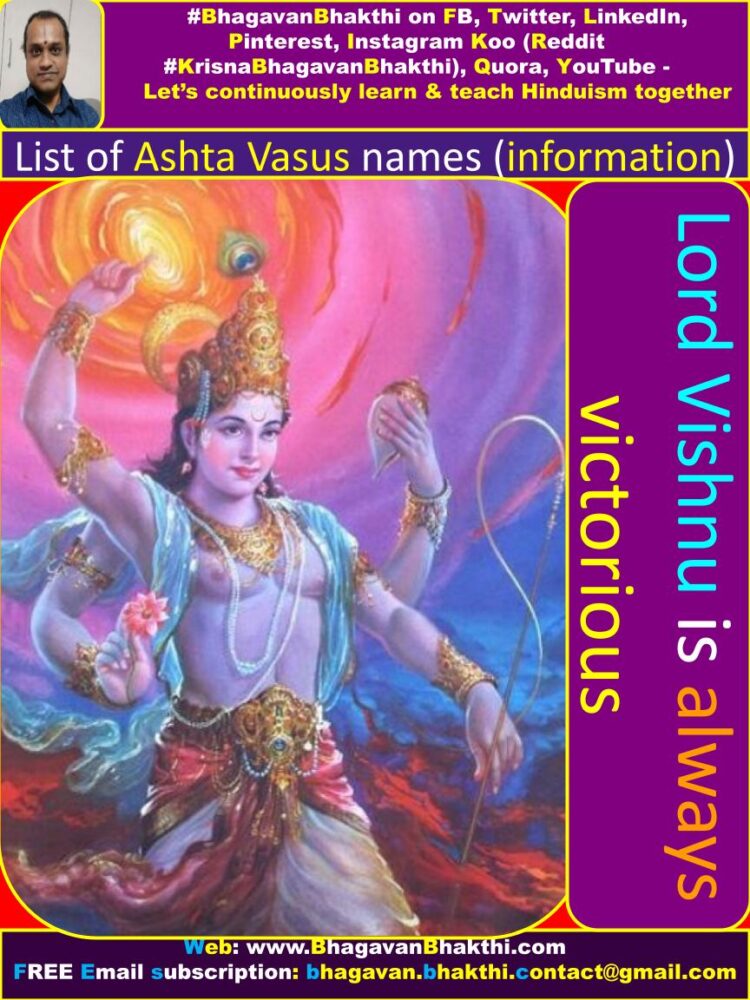
Jishnu is one of the salient features of the Sarvottama / Supreme Lord Sri Vishnu. Lord Sri Jishnu is the Sarvottama / Supreme Lord is ever victorious. Lord Sri Jishnu is the personification of ‘Vijaya and Jaya‘ (victorious and always victorious).
Lord Sri Jishnu is invincible. Lord Sri Jishnu’s very nature is ‘victory‘ and is always triumphant. Lord Sri Jishnu’s very name, thought and devotion bring victory to His devotees. Vijaya (victory) is one of the unlimited names of Lord Sri Vishnu (Sri Vishnu Sahasranaama Stotra shloka no. 16).
Lord Sri Jishnu is the one who grants success in all endeavors (Vijaya / Victory) to the deserving as per his / her capabilities.
Lord Sri Jishnu / Vishnu is both ‘Vijaya‘ and ‘Jaya‘. Lord Sri Jishnu / Vishnu is ‘Vijayo-Jaya Vardhana‘, that is, someone who always flourishes in victory.
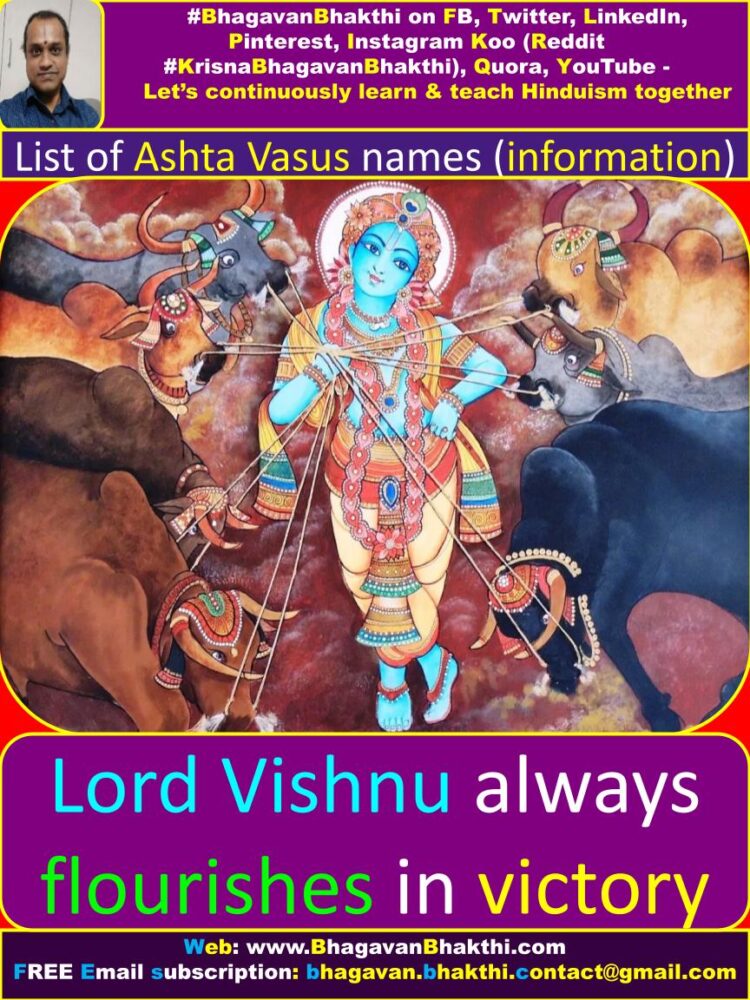
Lord Sri Keshava (Keshav) as the antaryami of the Vasu named Praana information is as given below:
Lord Sri Keshava (Keshav) is one of the popular names of Lord Sri Vishnu (Lord Sri Krishna). Name Lord Sri Keshava is considered as ‘Moolaroopa‘ (original form) of the Primordial Sarvottama / Supreme Lord Sri Vishnu.
Lord Sri Keshava is the origin and governing Bhagavan / Lord of Brahma Deva + Rudra Deva (Lord Shiva). The word ‘Kesha‘ is a Sanskrit name word. It’s meaning is hair(s) or a ray of light.
Thus the meaning of the name Keshava (Keshav) is, “someone who has got a very long and beautiful hair with golden color. Those hairs are very charming, filled with supreme sugandha / fragrance“.
Lord Sri Keshava is the someone, who is the tormentor of his enemies, and the one who’s very chanting removes sorrows and sufferings.
Without chanting of the name of Lord Sri Keshava (श्री केशवाय नमः / śrī kēśavāya namaḥ / Sri Keshavaaya Namaha) none of the Vedic rituals begins.
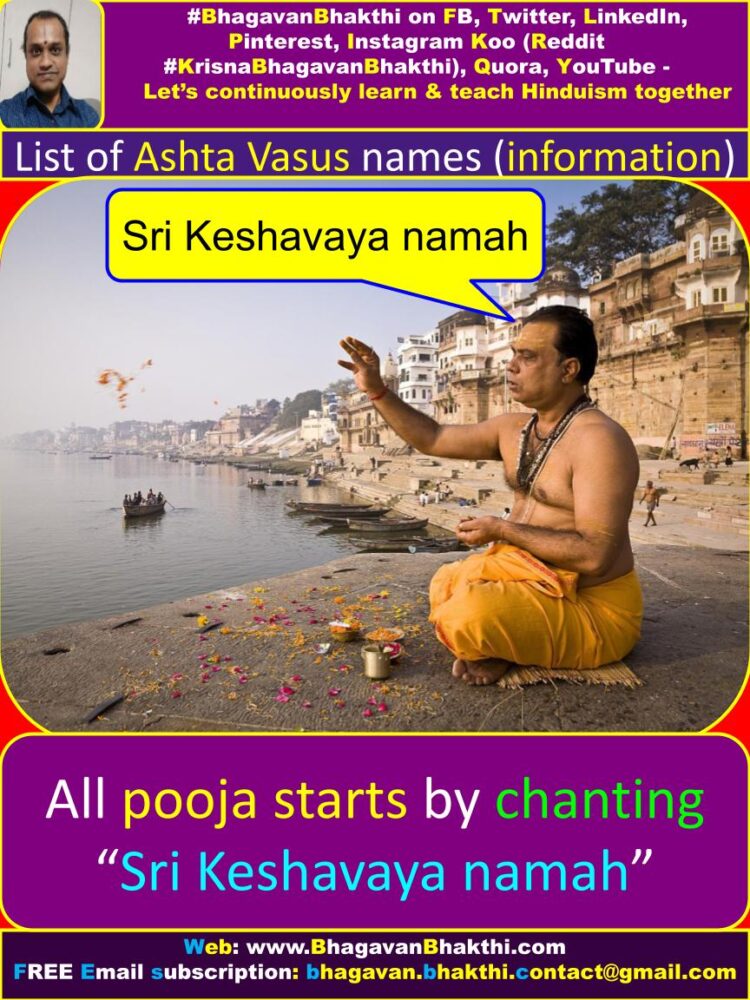
Another meaning of the name Keshava is, someone who is the slayer of the demon named ‘Keshi‘ and hence is referred as Keshiha. Lord Sri Krishna is famously called as ‘Keshava‘. We can easily find a reference to the name ‘Keshava‘ in the shloka no. 3 and 69 of Sri Vishnu Sahasranaama Stotram.
कालनेमिनिहा वीरः शौरिः शूरजनेश्वरः । त्रिलोकात्मा त्रिलोकेशः केशवः केशिहा हरिः ॥ 69 ॥
ಕಾಲನೇಮಿನಿಹಾ ವೀರಃ ಶೌರಿಃ ಶೂರಜನೇಶ್ವರಃ । ತ್ರಿಲೋಕಾತ್ಮಾ ತ್ರಿಲೋಕೇಶಃ ಕೇಶವಃ ಕೇಶಿಹಾ ಹರಿಃ ॥ 69 ॥
kālanēminihā vīraḥ śauriḥ śūrajanēśvaraḥ। trilōkātmā trilōkēśaḥ kēśavaḥ kēśihā hariḥ॥ 69॥
Lord Sri Vishnu as the antharyami of the Vasu named Dosha information is as given below:
In the very first shloka of ‘Sri Vishnu Sahasranama Stotram’, Lord Sri Vishnu is referred to as ‘Bhoota-Bhavya-Bhavat-Prabhuh‘:
विश्वं विष्णुर्वषट्कारो भूतभव्यभवत्प्रभुः । भूतकृद्भूतभृद्भावो भूतात्मा भूतभावनः ॥ 1 ॥
ವಿಶ್ವಂ ವಿಷ್ಣುರ್ವಷಟ್ಕಾರೋ ಭೂತಭವ್ಯಭವತ್ಪ್ರಭುಃ । ಭೂತಕೃದ್ಭೂತಭೃದ್ಭಾವೋ ಭೂತಾತ್ಮಾ ಭೂತಭಾವನಃ ॥ 1 ॥
viśvaṁ viṣṇurvaṣaṭkārō bhūtabhavyabhavatprabhuḥ। bhūtakr̥dbhūtabhr̥dbhāvō bhūtātmā bhūtabhāvanaḥ॥ 1॥
Lord Sri Vishnu is Lord (prabhu) of the past (bhoota), present (bhavya) and future (bhavat). Lord Sri Vishnu is the ‘Mahadbhootah‘, that is, someone who is an ultimately and gigantically present in this multiverses.
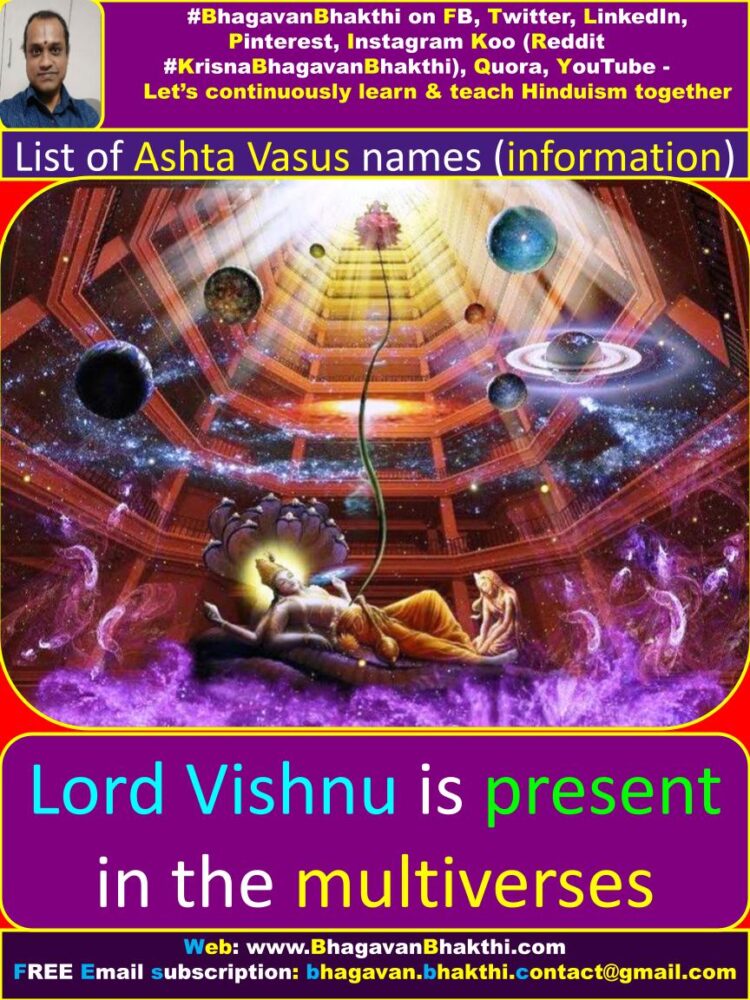
Lord Sri Vishnu is the ‘Bhootaatma‘, that is, someone who dwells in all beings and is present in everything and everywhere. Lord Sri Vishnu is beyond description.
Lord Sri Vishnu is the greatest and ultimate Bhagavan / God, that is, someone who is all pervasive, eternal, beyond all boundaries and for whom there is no limit either by space, time or location.
Lord Sri Vishnu is the one who has infinite number of forms and He dwells in the entire multiverses.
Lord Sri Vishnu is invincible and omnipresent. Lord Sri Vishnu’s glory is infinite. Lord Sri Vishnu is highly meritorious among the most meritorious. No one can describe or define Lord Sri Vishnu precisely.
Starting from Goddess Sri Lakshmi Devi, Lord Sri Brahma Deva, Goddess Sri Sarasvati Devi, Lord Sri Rudra Deva (Lord Shiva), Goddess Sri Parvati Devi, Lord Sri Indra Deva, Lord Sri Surya Deva etc. etc. etc., no one can’t precisely describe Lord Sri Vishnu.
Lord Sri Vishnu is the Lord of Lords, that is, Sarvottama / Supreme Bhagavan / God of the multiverses (unlimited Universes).
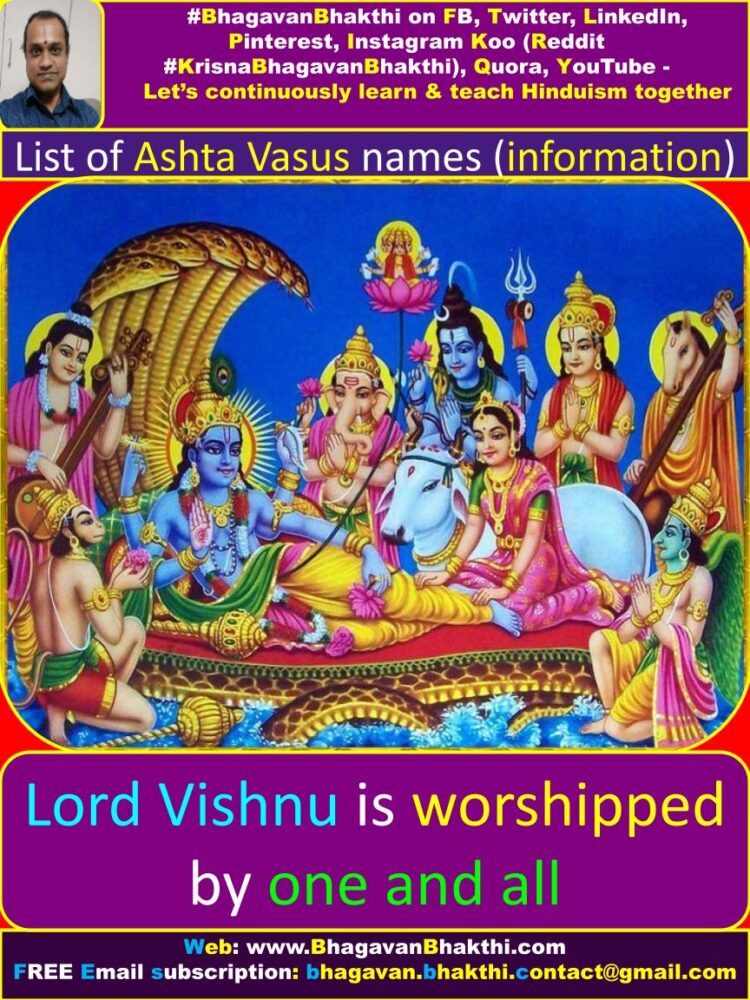
Lord Sri Hari (Vishnu) as the antaryami of the Vasu named Arka information is as given below:
The name ‘Hari‘ refers to the green colored Supreme Lord Sri Vishnu (Even in Hindi we use word ‘hara’ for the color green). Lord Sri Vishnu is called as Lord Sri Hari and is he ‘saakshaat‘ (yes definitely) the ‘Parabrahma‘ Lord Srimann Narayana (Vishnu).
Lord Sri Hari (Vishnu) is the मोक्ष कारक (mōkṣa kāraka) (Moksha kaaraka), that is, someone who is the destroyer (Hari) of the cycle of birth and death. Lord Sri Hari also means the one who steals, that is, someone who steals (destroys) our ignorance.
Lord Sri Krishna as the antaryami of the Vasu named Agni information is as given below:
In the 10th chapter of the Great Srimad Bhagavad Gita, that is, in the ‘Vibhooti Yoga‘, Lord Sri Krushna (Krishna) says that –
“Vasoonaam Paavakaschaasmi”, that is, ‘I am (Lord Sri Krishna) the Agni (fire God) among all the Vasus‘. Paavaka is another name of Lord Sri Agni Dev.
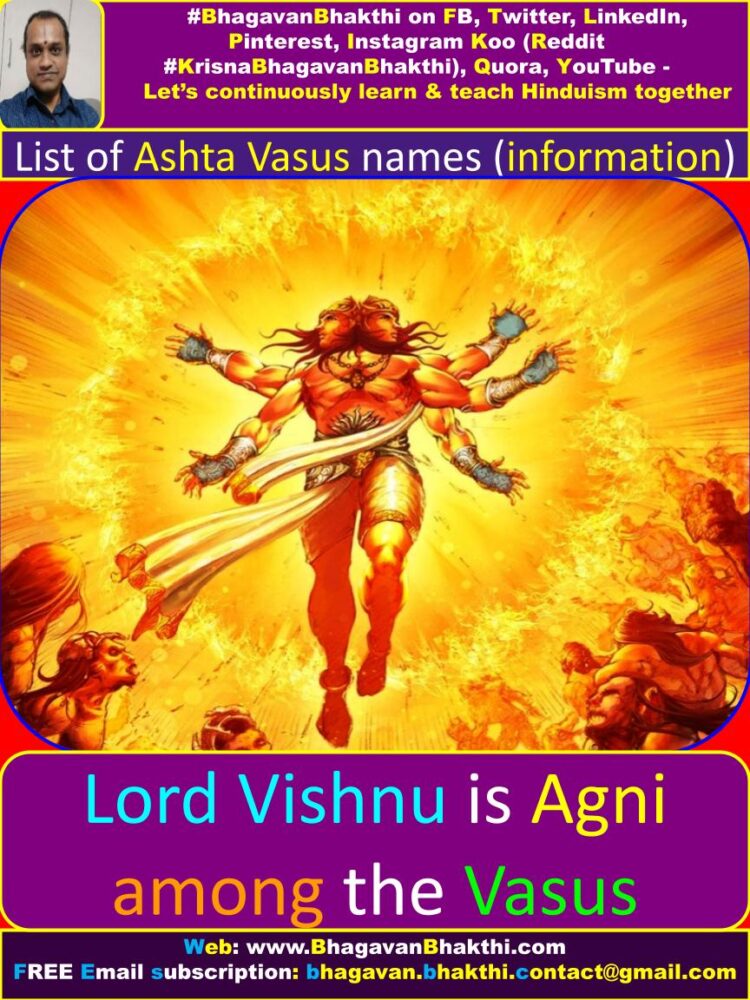
Even though he is called by various names like Keshava, Govinda, Damodara, Madhusudana, etc., He is very popularly and lovingly known as Lord Sri Krishna or Sri Krishna.
It is said that the name ‘Sri Krishna‘ was suggested by Rishi (Sage) Garga who had earlier meditated on this name (Sri Krishna) before Sri Krishna’s avatar on the earth.
[We should note that Lord Sri Vishnu had this name ‘Sri Krishna‘ earlier itself. This name ‘Sri Krishna‘ and all the Lord Sri Vishnu’s names are existing since the unknown time and will prevail until the grand infinite period.]
We find a reference to the name ‘Krishna‘ in shloka no. 7 of ‘Sri Vishnu Sahasra Naama Stotram‘: ‘Agraahyah shaashvathah Krishna lohitaakshah pratardanah‘
अग्राह्यः शाश्वतो कृष्णो लोहिताक्षः प्रतर्दनः । प्रभूतस्त्रिककुब्धाम पवित्रं मङ्गलं परम् ॥ 7 ॥
ಅಗ್ರಾಹ್ಯಃ ಶಾಶ್ವತೋ ಕೃಷ್ಣೋ ಲೋಹಿತಾಕ್ಷಃ ಪ್ರತರ್ದನಃ । ಪ್ರಭೂತಸ್ತ್ರಿಕಕುಬ್ಧಾಮ ಪವಿತ್ರಂ ಮಂಗಳಂ ಪರಮ್ ॥ 7 ॥
agrāhyaḥ śāśvatō kr̥ṣṇō lōhitākṣaḥ pratardanaḥ । prabhūtastrikakubdhāma pavitraṁ maṅgaḷaṁ param॥ 7॥
The name and the word ‘Krishna‘ is actually to be pronounced as ‘Krushna‘ and not as Krishna. Krishna means “dark in color and is all supremely attractive“.
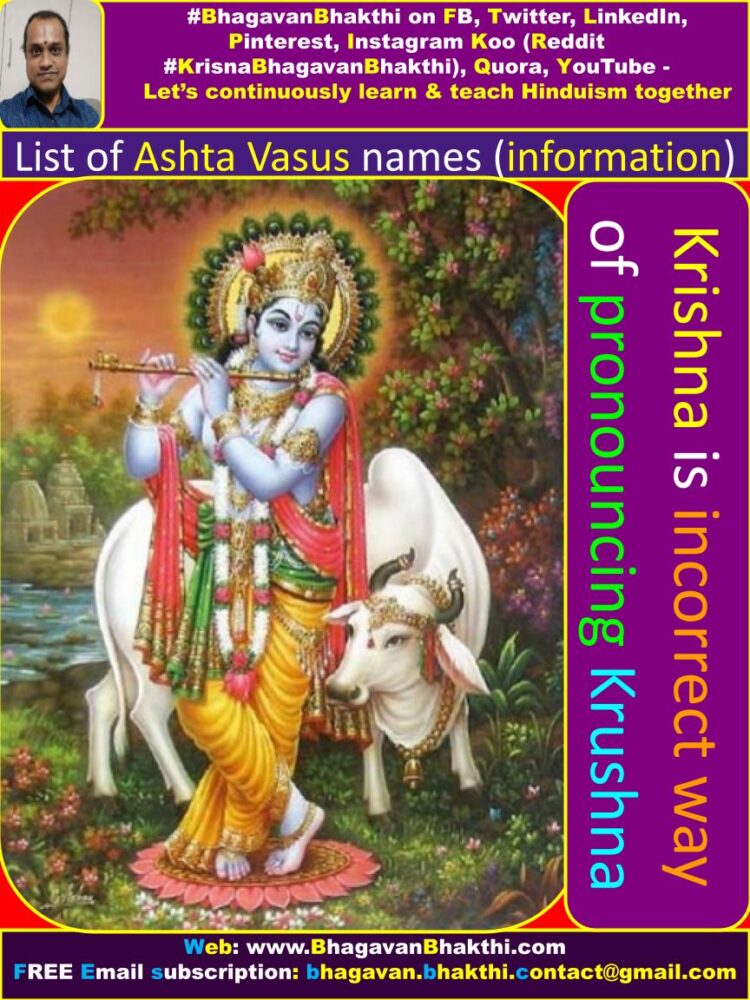
In the word ‘Krushna‘, ‘Krush’ refers to everlasting (shaaswata) and ‘Na‘ refers to ‘sath svaroopa‘. Krishna or Krushna means सत्-चित्-आनन्द (sat-cit-ānanda) (Sat-Chit-Ananda), that is, someone who is complete and blissfully happy for ever.
“Karshateethi Krushnah” (कर्षतीथि कृष्णः) (karṣatīthi kr̥ṣṇaḥ), meaning someone who has the character, capacity and capability of attracting anyone with his beautiful, charming, delightful, every smiling and fascinating figure.
“Krushnastu svayam Bhagavan” (कृष्णस्तु स्वयं भगवान्) (kr̥ṣṇastu svayaṁ bhagavān), that is, Lord Sri Krishna on several occasions had revealed that: “I am the Paramatma’ (I am the ultimate soul of everyone) (I am the God)“.
Lord Sri Krishna avatar has gained unique prominence and significance among the several avatars of Lord Sri Vishnu.
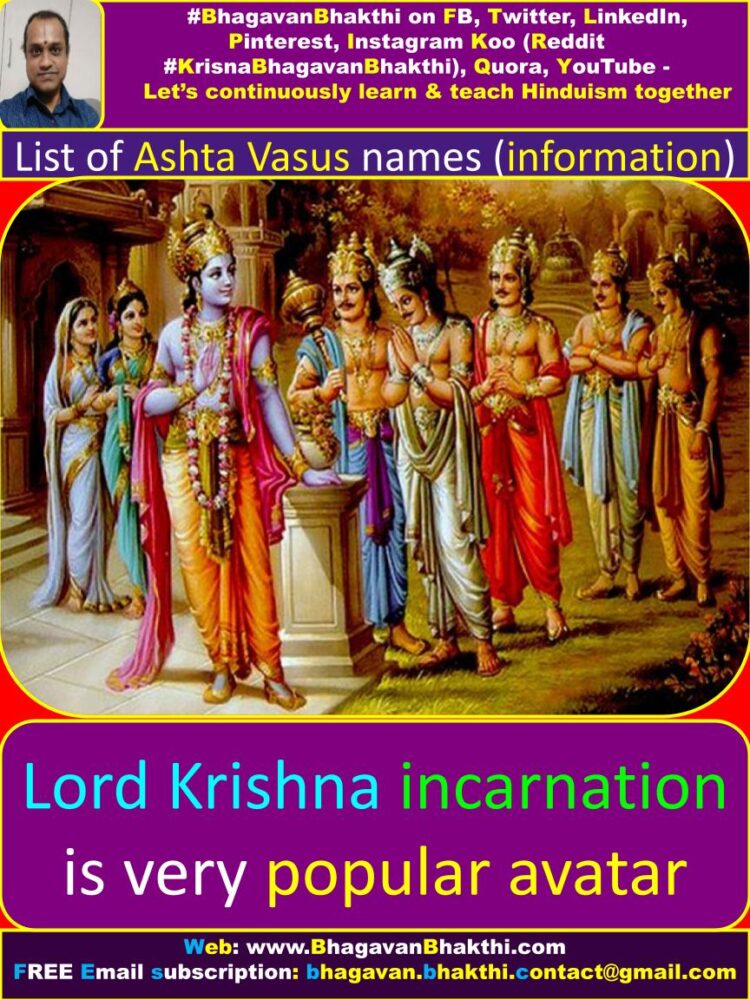
(Note: But it doesn’t mean that other avatars are not significant. All the avatars of Lord Sri Vishnu is unique and highly significant. Lord Sri Vishnu shows the leela / drama / pastimes as per the avatar, as per time, as per the people present around him, as per the requirement, etc.)
Lord Sri Krishna’s preaching through Srimad Bhagavad Gita is a Divine gift to the mankind which is accepted by across the world.
The story of Lord Sri Krishna never ends. All have their own capability and our capacity to describe Lord Sri Krishna with limited knowledge and when our limit is reached we abandon it half way.
Lord Sri Adhokshaja as the antaryami of the Vasu named Dyau information is as given below:
Lord Sri Adhokshaja (अधोक्षज) (adhōkṣaja) is one of the unlimited names of Lord Sri Vishnu. We can find a reference to this name in shloka no. 44 of ‘Sri Vishnu Sahasranama Stotram‘ as given below:
वैकुण्ठः पुरुषः प्राणः प्राणदः प्रणवः पृथुः । हिरण्यगर्भः शत्रुघ्नो व्याप्तो वायुरधोक्षजः ॥ 44 ॥
ವೈಕುಂಠಃ ಪುರುಷಃ ಪ್ರಾಣಃ ಪ್ರಾಣದಃ ಪ್ರಣವಃ ಪೃಥುಃ । ಹಿರಣ್ಯಗರ್ಭಃ ಶತ್ರುಘ್ನೋ ವ್ಯಾಪ್ತೋ ವಾಯುರಧೋಕ್ಷಜಃ ॥ 44 ॥
vaikuṇṭhaḥ puruṣaḥ prāṇaḥ prāṇadaḥ praṇavaḥ pr̥thuḥ। hiraṇyagarbhaḥ śatrughnō vyāptō vāyuradhōkṣajaḥ॥ 44॥
Adhokshaja is one of the great features of the Sarvottama / Supreme Lord Sri Vishnu. Here, ‘Akshaja‘ means knowledge emanating from senses.
Adhokshaja is, someone who is beyond perception through senses (indriyas), beyond knowledge acquired through senses, the one who has eternal knowledge which will never degenerate or perish.
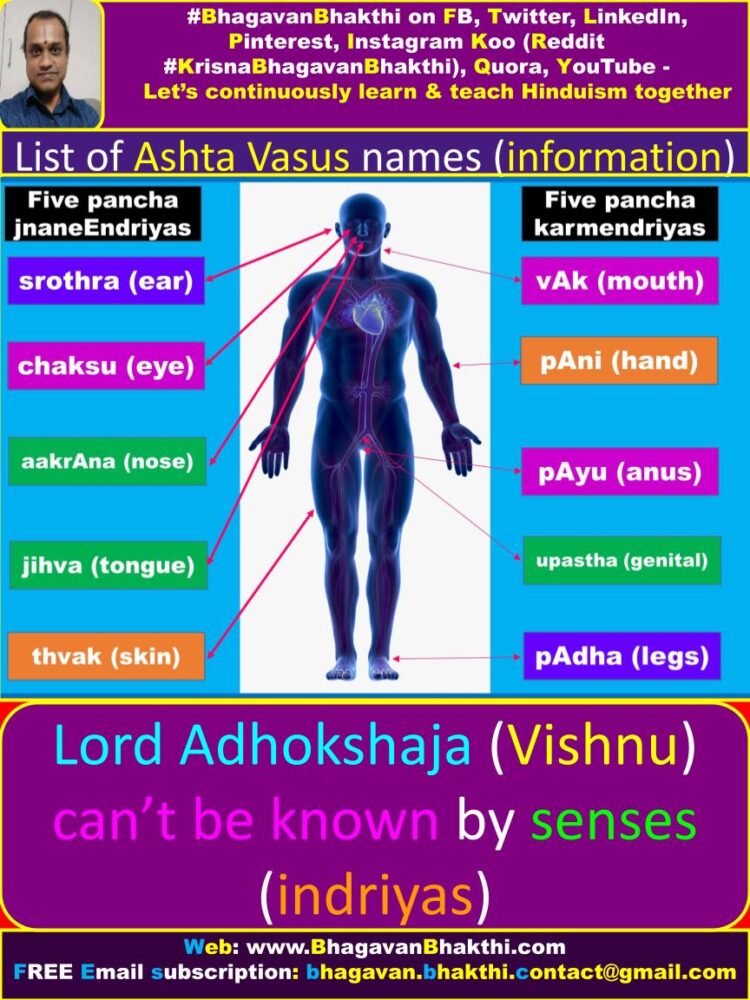
In the ‘Sri Venkatesha Stotram‘ from ‘Brahmanda Purana‘, Lord Sri Venkateswara (Lord Srinivas) (Lord Balaji) is addressed as ‘Adhokshaja‘.
For ordinary human beings he is just a ‘Shila Vigraha‘ (statue), but at ‘Tirumala Kshetra‘ (Tirupati), Lord Sri Venkateswara is standing in His original roopa / form of Aprakrita (Aprakruta) and is beyond our perception.
(Aprakruta or Aprakrita means, someone who is not natural or simple like others starting from Lord Sri Brahma Deva, Lord Shiva, etc.)
Lord Sri Madhava as the antaryami as the Vasu named Vibhavasu information is as given below:
Lord Sri Vishnu is called as ‘Madhava‘, that is, he is the consort of ‘Madhavi’ (Goddess Lakshmi name), that means, the one who is bestower to all and Lord of Supreme Most Knowledge.
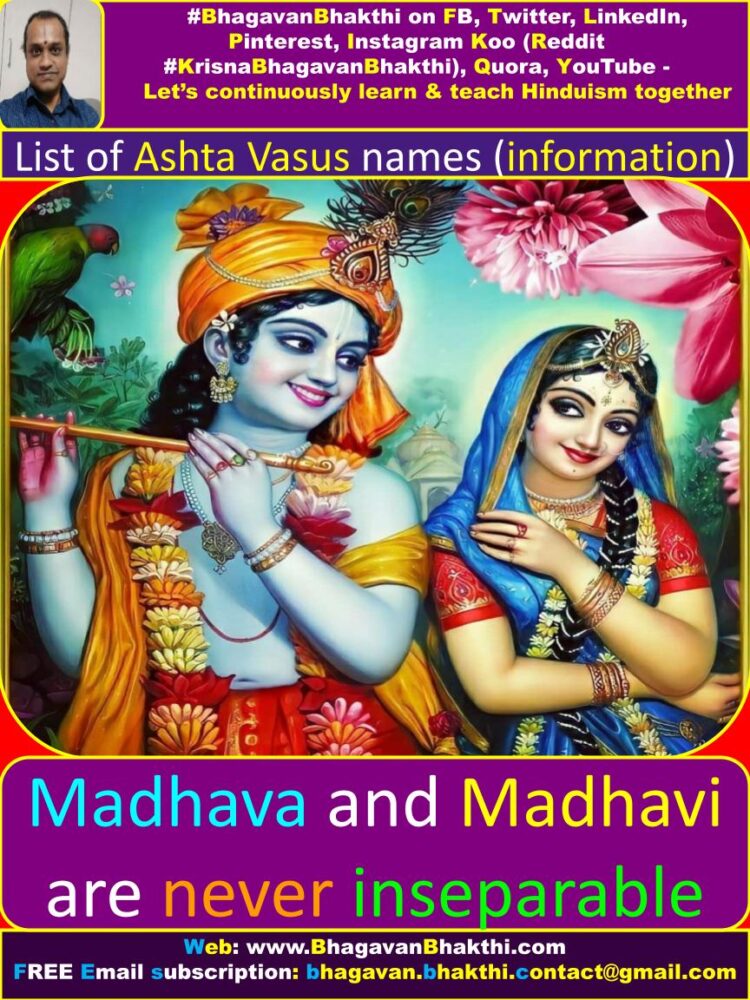
Lord Sri Madhava is the profounder or the one who advocates or the one who promulgate the knowledge of the Supreme being (Himself). Lord Sri Madhava is someone who directs an individual towards performing of good deeds and attaining true knowledge.
Lord Sri Madhava is “Madhavo-Madhusoodhana”, that is, someone who is as sweet and delicious as ‘Madhu‘ (divine honey) and also someone who is a great nourisher.
Also, Lord Sri Madhava is someone who is the slayer of demon named Madhu (and also a demon named Kaitabha) the one who was born in the clan of King Madhu. Thus Lord Sri Vishnu (Krishna) is known as ‘Madhusudana‘.
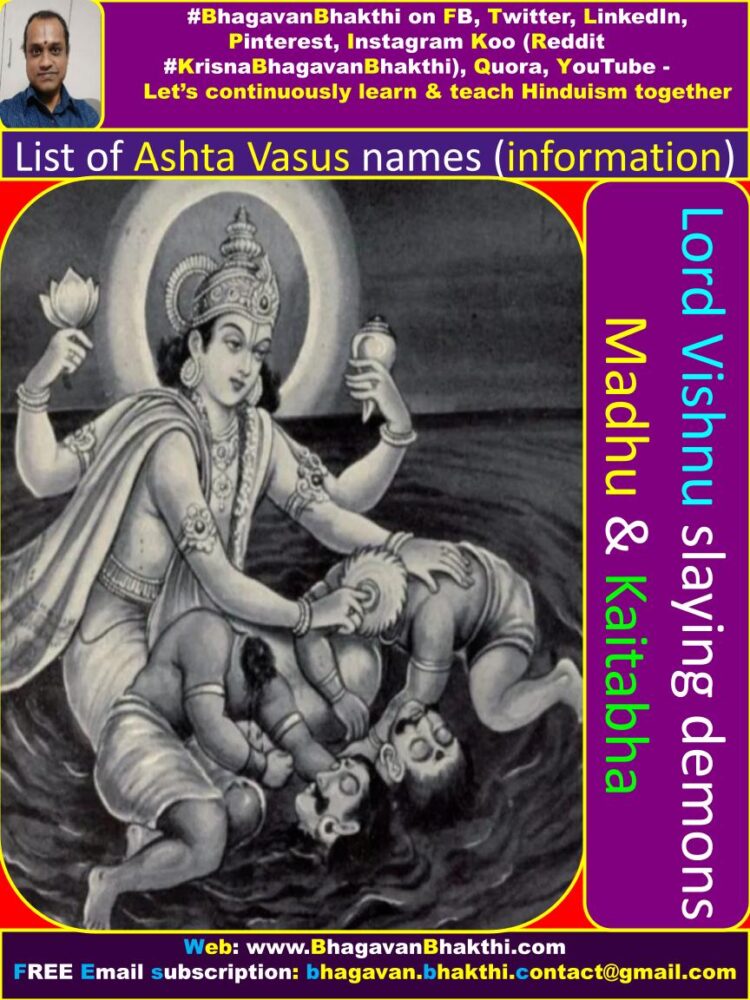
We find a reference to the words Madhava / Madhusudana in shloka no. 8,18,78 of Sri Vishnu Sahasranama Stotram.
ईशानः प्राणदः प्राणो ज्येष्ठः श्रेष्ठः प्रजापतिः । हिरण्यगर्भो भूगर्भो माधवो मधुसूदनः ॥ 8 ॥
वेद्यो वैद्यः सदायोगी वीरहा माधवो मधुः । अतीन्द्रियो महामायो महोत्साहो महाबलः ॥ 18 ॥
एको नैकः सवः कः किं यत्तत् पदमनुत्तमम् ।लोकबन्धुर्लोकनाथो माधवो भक्तवत्सलः ॥ 78 ॥
ಈಶಾನಃ ಈಶಾನಃ ಪ್ರಾಣದಃ ಪ್ರಾಣೋ ಜ್ಯೇಷ್ಠಃ ಶ್ರೇಷ್ಠಃ ಪ್ರಜಾಪತಿಃ । ಹಿರಣ್ಯಗರ್ಭೋ ಭೂಗರ್ಭೋ ಮಾಧವೋ ಮಧುಸೂದನಃ ॥ 8 ॥
ವೇದ್ಯೋ ವೈದ್ಯಃ ಸದಾಯೋಗೀ ವೀರಹಾ ಮಾಧವೋ ಮಧುಃ । ಅತೀಂದ್ರಿಯೋ ಮಹಾಮಾಯೋ ಮಹೋತ್ಸಾಹೋ ಮಹಾಬಲಃ ॥ 18 ॥
ಏಕೋ ಏಕೋ ನೈಕಃ ಸವಃ ಕಃ ಕಿಂ ಯತ್ತತ್ ಪದಮನುತ್ತಮಮ್ । ಲೋಕಬಂಧುರ್ಲೋಕನಾಥೋ ಮಾಧವೋ ಭಕ್ತವತ್ಸಲಃ ॥ 78 ॥
īśānaḥ prāṇadaḥ prāṇō jyēṣṭhaḥ śrēṣṭhaḥ prajāpatiḥ। hiraṇyagarbhō bhūgarbhō mādhavō madhusūdanaḥ॥ 8॥
vēdyō vaidyaḥ sadāyōgī vīrahā mādhavō madhuḥ। atīndriyō mahāmāyō mahōtsāhō mahābalaḥ॥ 18॥
ēkō naikaḥ savaḥ kaḥ kiṁ yattat padamanuttamam। lōkabandhurlōkanāthō mādhavō bhaktavatsalaḥ॥ 78॥
Continue reading about Hinduism from here : Hinduism information, facts, importance, significance etc.
More information will be added to this post on regular basis. Please visit after some time to get the updated information.
To watch videos on #Hinduism #Sanskrit language, SUBSCRIBE to my YouTube channel from this below link:
#BhagavanBhakthi YouTube channel
Dear friends, if you need any clarifications about this post, kindly let me know, I will definitely try to answer all of them.
Also your one LIKE, one COMMENT, One Share, one SUBSCRIPTION is highly important.
This will help to know the quality of this content and also it will be helpful to know if any improvements is required for the content.
If you feel this content is useful to you and has helped you to improve your knowledge, kindly share this with your well-wishers.
Because “SHARING MEANS CARING”.
To receive FREE EMAIL SUBSCRIPTION about #BhagavanBhakthi, you can send an email to [email protected] from your email ID.
NAMASTE!
Sri Gurubhyo Namaha
Sri Krishnaaya Namaha
Sri Krishnaarpanamastu
Share in Social Media
I respect your work, thanks for all the great posts.